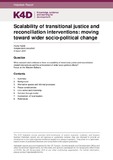Scalability of Transitional Justice and Reconciliation Interventions: Moving Toward Wider Socio-political Change
Abstract
Literature focusing on the aftermath of conflict in the Western Balkans, notes that many people remain focused on stereotypes and prejudices between different ethnic groups stoking fear of a return to conflict. This rapid review examines evidence focussing on various interventions that seek to promote inter-group relations that are greatly elusive in the political realm in the Western Balkan. Socio-political change requires a growing critical mass that sees the merit in progressive and conciliatory ethnic politics and is capable of side-lining divisive ethno-nationalist forces.
This review provides an evidence synthesis of pathways through which micro-level, civil-society-based interventions can produce ‘ripple effects’ in society and scale up to affect larger geographic areas and macro-level socio-political outcomes. These interventions help in the provision of alternative platforms for dealing with divisive nationalism in post-conflict societies. There is need to ensure that the different players participating in reconciliation activities are able to scale up and attain broader reach to ensure efficacy and hence enabling them to become ‘multiplier of peace.’ One such way is by providing tools for activism.
The involvement of key people and institutions, who are respected and play an important role in the everyday life of communities and participants is an important factor in the design and success of reconciliation initiatives. These include the youth, objective media, and journalists. The transformation of conflict identities through reconciliation-related activities is theorised as leading to the creation of peace constituencies that support non-violent approaches to conflict resolution and sustainable peace
The success of reconciliation interventions largely depends on whether it contributes to redefining otherwise antagonistic identities and hostile relationships within a community or society.
Citation
Haider, H. (2021). Scalability of transitional justice and reconciliation initiatives: moving toward wider socio-political change. K4D Helpdesk Report 953. Brighton, UK: Institute of Development Studies. DOI: 10.19088/K4D.2021.080DOI
10.19088/K4D.2021.080Is part of series
K4D Helpdesk Report;953Rights holder
© Crown copyright 2021Sponsor
FCDO (Foreign, Commonwealth and Development Office)Collections
- K4D [937]

